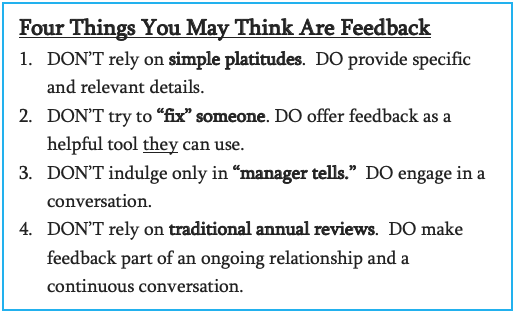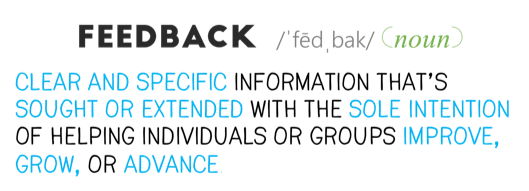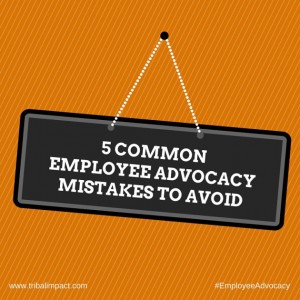This is my fourth blog in this series (you can find the first three on this topic here: blog one, blog two, and blog three). Let’s review. It’s past time to fix feedback and restore to its rightful place as a powerful and valuable tool for good. We must shed old ideas of what feedback is and adopt a new mindset and new approaches. We have a new definition of feedback and a list of four things that you may think (or used to think) are feedback, but actually aren’t.


In my prior blogs, we delved into the first three of the four examples of fake feedback. Now, it’s time to tackle that old, universally disliked ANNUAL PERFORMANCE REVIEW (cue the horror movie music here).
The annual review, as almost all of us have experienced it, conjures bad memories for most of us. I’m imagining you nodding in agreement, which is easy to do, since that’s what happens every time I speak on this subject. Because this outmoded approach misses the mark so badly, my first book was dedicated to my aspiration of rebooting performance management. Setting aside the full suite of traditional performance management issues, let’s examine its shortcomings through the lens of feedback.
Because there is a formal and accepted “process” of an annual review, we tend to bank up our views and perspectives until review time. This very common behavior leads to a number of troublesome issues:
- Because we pack everything into one review, they often become overwhelming information dumps that no one can effectively process.
- A blended summary of twelve months of observation means almost nothing. If you were to average the high temperatures of the last 365 days, would that average tell you anything about the temperature right now?
- There is often little context to help the recipient understand and process the feedback. The specifics of the climate and situations of the past year have faded, and in many cases, may be totally forgotten. How confusing is feedback like that?
- It’s too little, too late. What is shared, good or bad, may have occurred months ago.
- It places the manager in the role of “know all, tell all,” and the employee in the role of passive recipient. (See Blog #3 <link> to learn all about this concern.)
What is the impact on the recipient of so-called “feedback” like this? At best, they may be dazed and confused, and at worst, thoroughly irritated that what they heard was generally useless (or irrelevant) and is, in any event, offered too late to be of any use.
Nothing about this process satisfies our definition of feedback. It isn’t clear and specific. It isn’t a dialogue, with the elements of seeking and extending I’ve described in prior blogs. The intent is certainly opaque, but if we really wanted to help someone improve and grow, would we wait an entire year to offer them help? Feedback isn’t about timelines and forms. It isn’t a judgment or evaluation. Feedback is about asking and receiving useful advice and insights on a continuous journey toward our goals. It’s about building trusting relationships and knowing that help is there. I started this series by asking you to think about the potential positive power of feedback, with the idea that it shouldn’t be a bad thing. As I said before, when we get it right, feedback lifts us up, helps us understand our strengths, shows us pathways to achieve that next step, and sometimes even changes the course of our lives.
I hope I’ve given you ideas and tools to help you get feedback right. I’ll no longer ask you to join our movement to #FixFeedback; if you’ve been reading along, considering these ideas, and trying them out, you’re already in. So, let me be the first to welcome you to the Movement to #FixFeedback. Together we have the power to change the world, one positive feedback experience at a time.
Business & Finance Articles on Business 2 Community
(31)
Report Post






